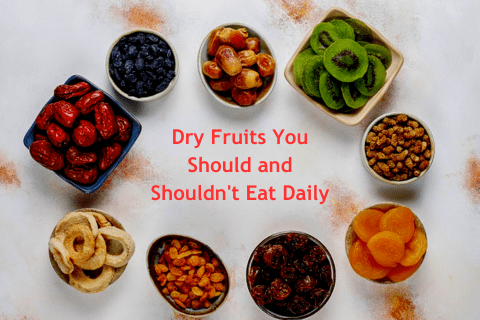
Introduction
Incorporating dry fruits into your daily diet can be a nutritious and delicious way to boost your overall health. These natural wonders pack a punch of vitamins, minerals, and antioxidants that can enhance your well-being in numerous ways. However, it’s essential to recognize that not all dry fruits are created equal in terms of their nutritional benefits and impact on your health.

In this comprehensive guide, we will embark on a journey through the world of dry fruits, unveiling the ones you should wholeheartedly embrace as part of your daily diet and those that warrant a more cautious approach. Whether you’re on a quest for better nutrition, seeking to manage your weight, or simply curious about the potential health benefits, our guide is designed to provide you with invaluable insights and knowledge to make informed dietary choices. So, let’s dive in and discover the exceptional world of dry fruits and their role in your daily nutrition.
The Benefits of Daily Dry Fruits Consumption
Dry fruits, often referred to as “nature’s powerhouses,” are packed with a plethora of essential nutrients that can significantly enhance your overall health when incorporated into your daily diet. In this section, we’ll delve into the nutritional value of dry fruits and their pivotal role in maintaining a balanced and nutritious eating plan.
Nutritional Powerhouses
Dry fruits encompass a diverse array of options, each offering a unique set of health benefits. Almonds, walnuts, pistachios, raisins, apricots, and dates are among the most popular choices, and they are laden with vitamins, minerals, and antioxidants.
Healthy Dry Fruits
When we say “healthy dry fruits,” we’re not just talking about their calorie content but their overall nutritional profile. Almonds, for instance, are an excellent source of heart-healthy monounsaturated fats, vitamin E, and dietary fiber. These elements are known to promote cardiovascular health, aid in digestion, and boost skin health.
Nutritious Dry Fruits
Another phrase we often encounter is “nutritious dry fruits.” This term encompasses a broader spectrum of dried fruits that provide an impressive array of nutrients. For instance, raisins are packed with iron, potassium, and antioxidants, making them a nutritious choice for those looking to improve their energy levels and maintain overall vitality.
Contributing to Overall Well-being
Daily consumption of these nutritious and healthy dry fruits can have a profound impact on your well-being. The vitamins and minerals found in dry fruits can strengthen your immune system, help maintain healthy blood pressure, and support bone health. The antioxidants present in many dry fruits can combat oxidative stress, reducing the risk of chronic diseases and promoting healthy aging.
Furthermore, their fiber content can aid in digestion, help control blood sugar levels, and contribute to a feeling of fullness, which can be particularly beneficial for those looking to manage their weight.
In short, daily consumption of dry fruits is not only a delightful culinary experience but also a smart nutritional choice. By incorporating these “healthy dry fruits” and “nutritious dry fruits” into your daily diet, you can contribute significantly to your overall well-being. In the following sections, we will explore specific dry fruits that are particularly beneficial for daily consumption and provide guidelines for moderation and choices to be cautious about.
Dry Fruits to Include in Your Daily Diet
When it comes to selecting dry fruits for daily consumption, certain options stand out as nutritional powerhouses, offering a wide array of health benefits. In this section, we’ll introduce you to some of these top contenders and explore why they are highly recommended for inclusion in your daily diet.
Almonds: Nature’s Nutrient Treasure
Almonds are often hailed as one of the best dry fruits for daily consumption, and for good reason. These little wonders are packed with essential nutrients that promote overall health. Almonds are an excellent source of heart-healthy monounsaturated fats, which can help lower bad cholesterol levels and reduce the risk of heart disease. They are also rich in vitamin E, an antioxidant that supports skin health and immune function. Furthermore, almonds provide a satisfying crunch and are a good source of dietary fiber, aiding in digestion and helping you feel full, which can be beneficial for weight management.
Walnuts: Brain-Boosting Superstars
Walnuts are another dry fruit that deserves a prominent place in your daily diet. They are known for their unique omega-3 fatty acid content, which is essential for brain health and may help improve cognitive function. Walnuts are also rich in antioxidants and provide a healthy dose of plant-based protein, making them an excellent choice for vegetarians and vegans. Additionally, they contain minerals like magnesium and phosphorus, which are crucial for bone health and overall well-being.
Raisins: Natural Energy Boosters
Raisins are small, but they pack a punch when it comes to health benefits. These dried grapes are a concentrated source of natural sugars, providing quick energy when you need it most. They are also high in dietary fiber, aiding in digestion and promoting a feeling of fullness. Raisins are rich in antioxidants like resveratrol, which may contribute to heart health and protect against certain chronic diseases. Additionally, they contain essential minerals such as potassium, iron, and calcium, which support various bodily functions.
Apricots: A Nutrient-Rich Delight
Dried apricots are a delightful addition to your daily diet. They are a great source of vitamins, particularly vitamin A, which is beneficial for eye health and immune function. Apricots also contain dietary fiber, aiding in digestive regularity, and they’re rich in potassium, which can help regulate blood pressure. Their natural sweetness makes them a satisfying and healthier alternative to sugary snacks.
Dates: Nature’s Candy
Dates are often referred to as “nature’s candy” due to their natural sweetness. They are an excellent source of energy due to their high sugar content, making them a perfect choice for a quick pick-me-up snack. Dates are also rich in dietary fiber, which aids in digestion and helps regulate blood sugar levels. They contain essential minerals like potassium and magnesium, which contribute to heart health and muscle function.
Including these dry fruits in your daily diet can have a profound impact on your health. They offer a wealth of essential nutrients, contribute to heart health, aid in weight management, and provide a satisfying and nutritious addition to your meals and snacks. Whether you’re looking for the best dry fruits for health or striving to maintain a balanced diet, these options are sure to support your goals. In the following sections, we’ll explore how to incorporate these dry fruits into your daily meals and provide guidelines for moderation.
Read Also: Two Minutes for Better Health: How a Post-Meal Walk Can Lower Blood Sugar
Portion Control and Moderation
When it comes to incorporating dried fruits into your daily diet, moderation is key. While dry fruits are indeed a nutritious and delicious snack option, consuming them in excess can lead to excessive calorie intake and potential health issues. In this section, we will emphasize the importance of moderation when consuming dry fruits daily and provide guidelines on portion sizes to prevent overindulgence.
Importance of Moderation:
Caloric Density
Dried fruits are calorie-dense due to the removal of water content. They provide a concentrated source of nutrients and energy. Overindulging in them can lead to weight gain and excessive calorie intake.
Sugar Content
Many dried fruits contain natural sugars, such as fructose. Excessive sugar intake can contribute to spikes in blood sugar levels and, over time, may lead to insulin resistance and other health issues.
Fiber and Nutrients
While dried fruits are rich in vitamins, minerals, and dietary fiber, excessive consumption can still be detrimental. Too much fiber can cause digestive discomfort, such as bloating and diarrhea.
Guidelines on Portion Sizes
To enjoy the benefits of dried fruits without overindulging, consider the following guidelines for your daily dry fruit portion:
Serving Size
A typical serving size for dried fruits is about 1 ounce, or 28 grams. This is roughly equivalent to a small handful or two tablespoons.
Frequency
Aim to consume dried fruits in moderation, ideally as a daily snack. However, the frequency and portion size may vary depending on your individual dietary needs, activity level, and overall calorie intake.
Incorporate Variety
Rotate the types of dried fruits you consume to ensure a diverse range of nutrients. Popular options include raisins, apricots, dates, figs, and prunes.
Consider Caloric Intake
Be mindful of your overall daily calorie intake and adjust your dry fruit portion accordingly. If you’re consuming other calorie-dense foods, you may want to reduce your dried fruit portion.
Pair with Other Foods
Combining dried fruits with other healthy foods like nuts, yogurt, or whole-grain cereals can help you feel satisfied with smaller portions.
Listen to Your Body
Pay attention to hunger and fullness cues. Eating slowly and mindfully can prevent overindulgence.
Consult a Nutritionist
For personalized guidance on dried fruit daily intake and portion sizes, consult a registered dietitian or nutritionist who can consider your specific dietary needs and goals.
Dry Fruits to Avoid Daily
While dried fruits are generally considered a healthy snack option, there are certain varieties that should be consumed in moderation or even avoided daily due to their high sugar or calorie content. In this section, we will discuss these dry fruits and explain the potential negative effects of excessive consumption.
Dry Fruits to Avoid Daily
Dates
Dates are a natural sweetener and are exceptionally high in calories and sugar. Consuming them daily in large quantities can lead to an excessive calorie intake and spikes in blood sugar levels.
Raisins
Raisins are another sweet, dried fruit that can be high in sugar. They are often used as a topping in various dishes, but it’s important to use them sparingly to avoid excess sugar consumption.
Dried Apricots
Dried apricots are nutritious but can also be calorie-dense due to their natural sugars. Eating them daily in large quantities may contribute to weight gain and blood sugar fluctuations.
Nuts To Avoid Daily
In addition to certain dried fruits, some types of nuts should also be consumed in moderation or avoided daily due to their high calorie and fat content. Here are a few examples:
Cashews
Cashews are delicious and nutritious, but they are relatively high in calories and fat. Excessive consumption can contribute to weight gain and increase the risk of heart disease.
Brazil Nuts
Brazil nuts are an excellent source of selenium, an essential mineral for good health. However, they should be consumed in moderation because eating too many can lead to selenium toxicity, which can have adverse effects on health.
Hazelnuts
Hazelnuts are another nutritious nut, but like cashews, they are high in calories and fat. Overindulging in hazelnuts can lead to weight gain and increase the risk of heart disease.
Macadamia Nuts
Macadamia nuts are known for their rich, buttery flavor. However, they are also calorie-dense and high in fat. Excessive consumption of macadamia nuts can contribute to weight gain and heart disease risk.
Pine Nuts
Pine nuts are commonly used in various dishes, but they are also calorie-dense and high in fat. Eating too many pine nuts can lead to weight gain and an increased risk of heart disease.
It’s important to note that these nuts are not unhealthy in moderation and can be part of a balanced diet. However, to avoid potential negative effects such as weight gain and heart disease risk, it’s advisable to consume them in appropriate portion sizes and not include them in your daily diet. As with dried fruits, moderation is key when incorporating nuts into your eating habits.
Potential Negative Effects of Excessive Consumption:
Weight Gain
Excessive consumption of calorie-dense dried fruits can lead to weight gain, as they contribute a significant number of calories to your daily diet. This is especially true if you’re not offsetting the extra calories with increased physical activity.
Blood Sugar Spikes
Dried fruits with a high sugar content can cause rapid spikes in blood sugar levels when consumed in excess. This can be problematic for individuals with diabetes or those at risk of developing the condition.
Dental Issues
The natural sugars in dried fruits can promote tooth decay and cavities when consumed regularly. Chewing dried fruits can also stick to teeth, providing an environment for harmful bacteria to thrive.
Digestive Discomfort
Some individuals may experience digestive discomfort, such as bloating and diarrhea, when they consume excessively fiber-rich dried fruits like prunes.
Nutrient Imbalance
Overconsumption of certain dried fruits may lead to an imbalance in nutrient intake, as they can be high in certain vitamins and minerals, such as potassium. This could be problematic if you have specific dietary restrictions or medical conditions.
Moderation in Dry Fruit Consumption
To enjoy the health benefits of dried fruits without experiencing negative effects, it’s essential to practice moderation. Here are some tips:
Limit High-Sugar Varieties
Consume high-sugar dried fruits like dates, raisins, and dried apricots in moderation. A small portion can still provide essential nutrients without excessive sugar intake.
Balance with Other Foods
Pair sweet, dried fruits with protein-rich snacks like nuts or plain Greek yogurt to help stabilize blood sugar levels and promote satiety.
Consider Dietary Goals
If you are on a calorie-restricted diet or need to manage your blood sugar, consult with a healthcare professional or nutritionist to determine the appropriate portion sizes for your specific needs.
As a result, while dried fruits are a healthy addition to your diet, some varieties should be avoided daily due to their high sugar or calorie content. Practicing moderation in dry fruit consumption and being mindful of the potential negative effects can help you enjoy the benefits of these nutritious snacks without compromising your overall health and well-being.
Incorporating Dry Fruits into Your Daily Meals
Incorporating dry fruits into your daily meals can be a delightful way to enjoy their nutritional benefits and add variety to your diet. Here are practical tips on how to include dry fruits in various meals and snacks, as well as creative recipes to make daily consumption more enjoyable and diverse:
1. Breakfast Ideas
Cereal Upgrade
Sprinkle a handful of your favorite dried fruits, such as raisins, cranberries, or chopped apricots, onto your morning cereal or oatmeal. This adds natural sweetness and extra nutrients to kickstart your day.
Yogurt Parfait:
Layer Greek yogurt with a mix of dried fruits, nuts, and a drizzle of honey. This creates a creamy and satisfying breakfast or snack option.
2. Lunchtime Options:
Salad Boost
Add dried fruits like dried cranberries, chopped figs, or apricots to your salads. They provide a delightful burst of sweetness and texture amidst the greens and veggies.
Sandwich or Wrap
Incorporate dried fruits like chopped dates or raisins into your sandwiches or wraps. They complement savory fillings and add a unique twist to your lunch.
3. Snacking Solutions
Trail Mix
Create your own custom trail mix by combining a variety of dried fruits, nuts, and seeds. This portable snack is perfect for on-the-go munching.
Energy Bites
Make homemade energy bites using a base of rolled oats, nut butter, and honey, and then mix in chopped dried fruits for added flavor and nutrition.
4. Dinner Delights
Rice Pilaf
Enhance your rice pilaf or grain-based dishes with dried fruits like currants, apricots, or even chopped dried plums. They add a delightful sweetness to savory meals.
Stuffed Poultry
When preparing stuffed chicken or turkey, include a mixture of dried fruits, herbs, and breadcrumbs in the stuffing for a burst of flavor and moisture.
Creative Recipes
Dried Fruit Chutney
Make a sweet and tangy chutney using dried fruits like raisins and apricots and a touch of vinegar. It pairs wonderfully with grilled meats or as a condiment for cheese boards.
Dried Fruit Smoothie
Blend dried fruits like dates or figs into your morning smoothie for natural sweetness and added fiber.
Dried Fruit and Nut Bars
Create your own no-bake energy bars by combining chopped dried fruits, nuts, seeds, and a binder like honey or nut butter. Press the mixture into a pan, refrigerate, and then cut into bars.
By incorporating dried fruits into your daily meals and snacks, you can elevate the flavor and nutritional value of your food. These ideas and recipes not only make daily consumption more enjoyable but also allow you to experience the diverse flavors and textures that dry fruits can bring to your diet. Remember to adjust portion sizes to maintain balance and moderation in your daily dry fruit intake.
Conclusion
In conclusion, dried fruits are a nutritious addition to your daily diet when consumed in moderation. Following these guidelines for daily dry fruit portion sizes will help you enjoy the health benefits of these snacks without the risk of overindulgence and excess calorie intake. Remember that moderation and balance are key to maintaining a healthy diet and lifestyle.
Incorporating healthy dry fruits into your daily diet can be a simple yet impactful way to enhance your overall nutrition and well-being. This article has highlighted several key takeaways to help you make informed choices for a healthier and more balanced lifestyle.
Key Takeaways:
Nutritional Value
Dry fruits are nutrient-rich, providing essential vitamins, minerals, fiber, and antioxidants. They can be a valuable addition to your daily diet.
Moderation is Key
Emphasize the importance of moderation when consuming dry fruits daily. While they offer numerous health benefits, overindulgence can lead to excess calorie intake and potential health issues.
Portion Control
Follow guidelines on portion sizes to prevent overindulgence. A typical serving size is about 1 ounce or 28 grams.
Variety Matters
Rotate the types of dried fruits you consume to ensure a diverse range of nutrients.
Mindful Snacking
Pay attention to your body’s hunger and fullness cues when snacking on dried fruits. Eating slowly and mindfully can prevent overconsumption.
Avoid High-Sugar and High-Fat Options
Some dried fruits and nuts, like dates, raisins, cashews, and macadamia nuts, should be consumed in moderation due to their high sugar or calorie content.
Creative Meal Ideas
Experiment with various meal and snack ideas to incorporate dried fruits into your daily routine. From breakfast to dinner, there are countless ways to enjoy them.
Informed Choices for a Healthier Lifestyle
In closing, making informed choices about your daily dry fruit consumption can contribute to a healthier and more balanced lifestyle. While dry fruits offer an array of health benefits, it’s crucial to exercise moderation and avoid certain high-calorie or high-sugar options. By doing so, you can harness the nutritional power of dry fruits to enhance your diet and overall well-being.
Remember that everyone’s dietary needs are unique, so consulting with a registered dietitian or nutritionist can provide personalized guidance on incorporating dry fruits into your daily meals and snacks. By optimizing your diet with these insights, you can take a proactive step towards achieving a healthier and more vibrant life.






